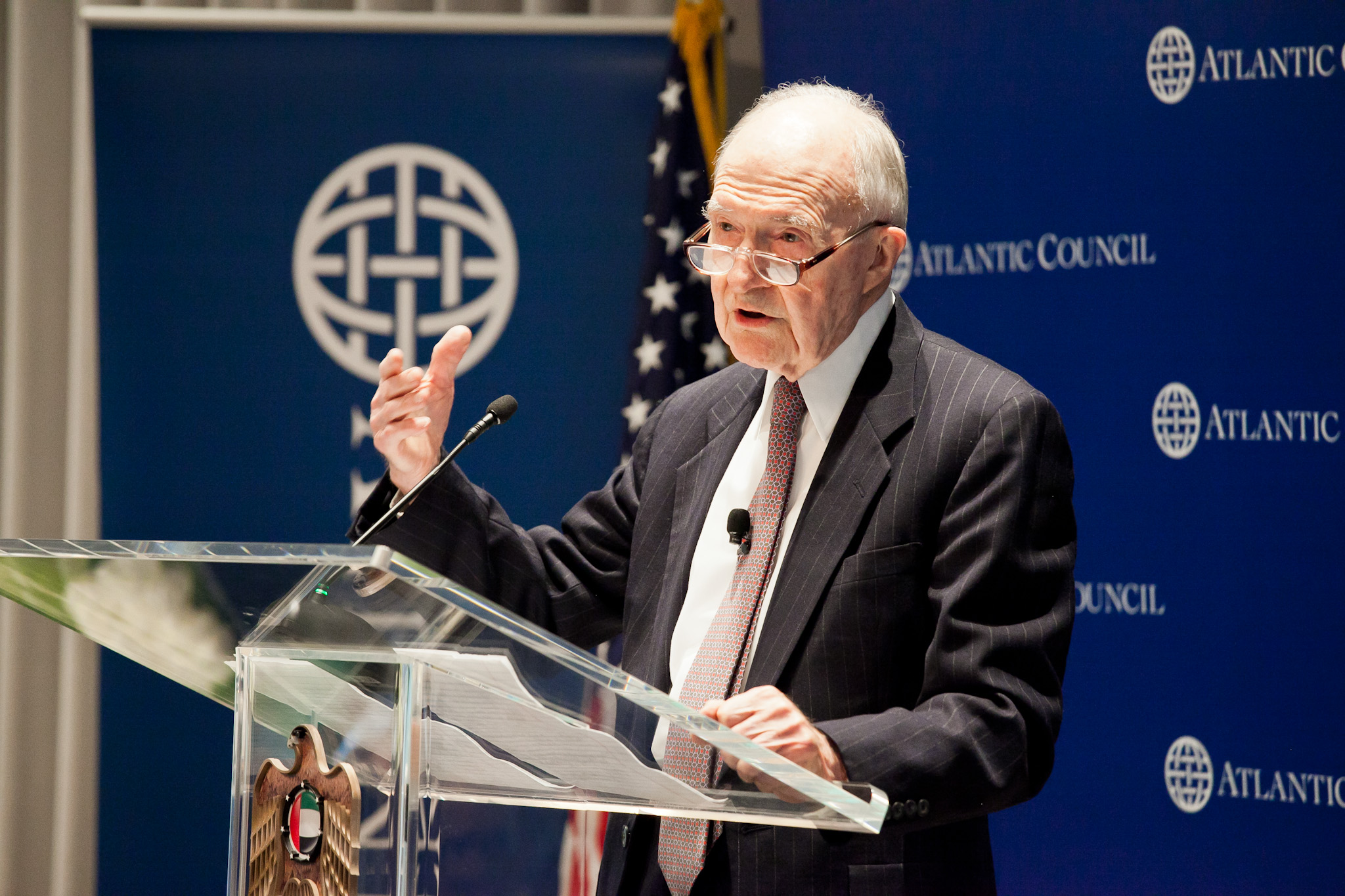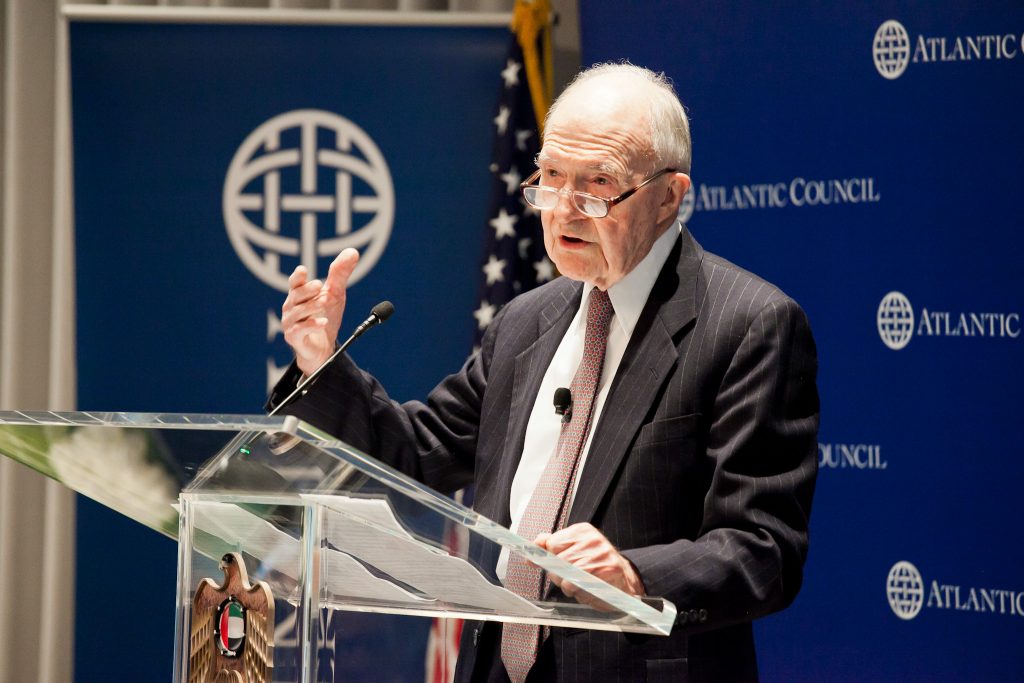 General Brent Scowcroft argues that NATO’s Libya intervention may point to the future of the military alliance as the go-to enforcer of UN Security Council resolutions.
General Brent Scowcroft argues that NATO’s Libya intervention may point to the future of the military alliance as the go-to enforcer of UN Security Council resolutions.
Delivering the Atlantic Council’s 5th Annual Christopher J. Makins Lecture at the Embassy of the United Arab Emirates, the National Security Advisor to Presidents Gerald Ford and George H.W. Bush noted that he was “not a fan” of intervening in Libya, which he saw as too low a priority for American national security to justify the use of force. Nonetheless, he sees it as a plausible model for the Alliance in which a call for help by regional actors is met with a United Nations Security Council resolution authorizing force and then a coalition of the willing of NATO members and regional partners carries out the operation.
He notes that the UN Charter envisions a standing force to serve just this purpose but that it has never come into being for obvious reasons; NATO might become the de facto realization of this vision.
If so, it would be a natural evolution of the Alliance. Scowcroft was instrumental in the post-Cold War transformation of NATO from an anti-Soviet collective security vehicle to one dedicated to realizing “a Europe whole and free.” He was highly skeptical of the expansion of Alliance membership that followed, reasonably worried that it would antagonize the Russians without adding much military power. While he’s long since come to terms with it, even in hindsight he laments that NATO rather than the EU became the primary vehicle for integrating the states of the former Eastern Bloc into Europe because doing so “stretched NATO’s strategic vision beyond its ability” to achieve consensus for action and funding.
This was demonstrated, Scowcroft argues, in the operations that followed. While Kosovo was highly successful, the bureaucratic plodding that characterized every decision so frustrated the United States that, when NATO invoked Article 5 after the 9/11 attacks the Bush administration brushed Europe off with a “don’t call us, we’ll call you.” Still, Europe eventually joined the Afghanistan mission and was the driving force behind the decision to intervene in Libya.
Scowcroft acknowledged that most of NATO’s member states are tired of fighting after the strain of all of this action but declared “fatigue doesn’t mean there are no threats.” Further, while Scowcroft believes Responsibility to Protect (R2P) directly conflicts with Article 2’s declaration that “Nothing contained in the present Charter shall authorize the United Nations to intervene in matters which are essentially within the domestic jurisdiction of any state,” its steady evolution into international law means NATO’s members, who after all constitute three fifths of the permanent membership of the Security Council, will likely be called on to intervene into out-of-area conflicts on a regular basis. Additionally, in the unlikely event a settlement is reached in the Israel-Palestinian dispute, NATO is likely the only body that would have the capacity and legitimacy with both parties to serve as peacekeepers.
Given NATO’s size and political diversity, Scowcroft argued, Libya’s coalition of the willing model is likely to obtain in many if not most of these situations.
He noted that Germany, in particular, still has a “deep revulsion to the use of force” as a consequence of World War II that shows no sign of abatement. So, the Alliance needs to codify a system formalizing what Operation Unified Protector did in practice: providing for NATO missions when there is no unanimity. Scowcroft suggested a tripartite model to replace the bimodal one that has existed historically. In the past, it was either a NATO mission, with all Allies participating, or not. But Libya points to a third option: A coalition of the willing consisting of some NATO members and some regional partners leveraging the benefits of NATO command and control institutions.
If anything, I’m more skeptical than Scowcroft about R2P and NATO expansion. The international impotence in the face of more than a year’s worth of atrocities by the Assad regime in Syria gives lie to the notion that R2P is a “doctrine” rather than a naive dream. Similarly, the relative inaction of NATO members to Russia’s invasion of sovereign Georgian territory mere weeks after the Lisbon Summit declaration that the country “would be” a member of NATO should have sobered those who were enthusiastic about treating a military alliance as a reward for progress rather than a commitment to shed blood.
Like Scowcroft, I was and remain skeptical of the wisdom of intervening in Libya. But he’s almost certainly right that it’s a model for future NATO operations rather than a one-off. Among the many problems created by the giddy expansion of Alliance membership is that it has become nearly impossible to achieve consensus. The smaller NATO was bureaucratic and plodding; the current model is unworkable in the face of anything short of a European invasion. Given the happy unlikelihood of that happening, the vaunted unanimity principle simply has to go away for NATO to be usable.
As to the Alliance becoming the Security Council’s enforcement arm, it’s a notion that Joshua Foust and I mocked as “Team America for R2P” in a New Atlanticist roundtable a year ago. While potentially a recipe for perpetual war, it’s unlikely to materialize any time soon for reasons that Scowcroft highlighted in his post-speech conversation with Atlantic Council president and CEO Fred Kempe: Russia and China are angry that their abstention to allow the passage of a Security Council authorization to protect civilians in Libya was used to justify a regime change mission and won’t let that happen again. We’ve already seen that in Syria, where the humanitarian nightmare far exceeds what was happening in Libya.
James Joyner is managing editor of the Atlantic Council.
